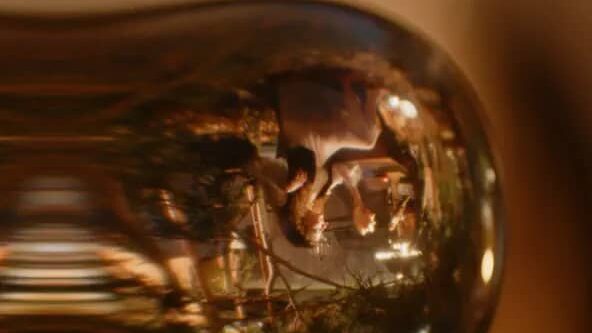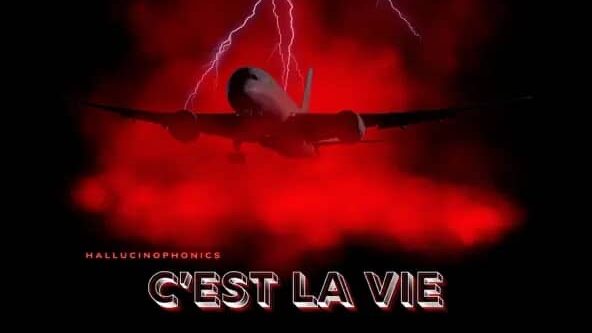“Past Life” by Night Teacher unfolds like a quiet confession, drawing listeners into a world where emotional distance and self-recognition weave together with haunting delicacy. The track, performed and written by Lilly Bechtel with production by Matt Wyatt, is a deeply atmospheric composition that thrives on its ability to evoke both warmth and alienation simultaneously. Built on an acoustic guitar foundation that feels raw and organic, the song carries a kind of late-night intimacy that invites deep reflection. The guitar tones shimmer with subdued vibrance, the percussion beats softly but insistently, and the bass lines move beneath the surface with steady grace. Together, these instrumental layers construct a sonic landscape that feels tactile and lived-in, as if each sound was recorded not in a studio but in a dimly lit room filled with quiet memory. The production choices highlight this texture beautifully, ensuring every instrument supports the fragile weight of Bechtel’s voice, which is tender, aching, and deeply human.
Vocally, Bechtel delivers each line with quiet intensity, balancing vulnerability and strength in perfect measure. Her tone, breathy yet grounded, acts as a bridge between the listener and the world of the song, turning private emotion into a shared experience. In the refrain “In a past life I was a human being,” her voice carries a resigned truth that feels both weary and awakening. This repetition functions like a mantra, grounding the listener in the emotional gravity of the track. The refrain becomes a statement of rediscovery, as if Bechtel is reclaiming something she once lost. Matt Wyatt’s production keeps her voice close and unfiltered, allowing every syllable to carry the weight of lived experience. Subtle reverb and gentle layering surround her vocals, creating a dreamlike halo that enhances the song’s introspective nature. Each instrumental part has space to breathe, allowing Bechtel’s voice to remain the emotional center without overpowering the arrangement.
The lyrics of “Past Life” are a study in poetic minimalism, crafted with a deliberate sense of quiet revelation. Bechtel writes not as a storyteller recounting an event, but as a poet piecing together fragments of self-awareness. The features the poignant question, “What’s the longest you’ve gone without wanting anything?” which immediately sets a reflective and unsettling tone. The verses explore feelings of displacement and identity, weaving images of borrowed homes, forgotten addresses, and domestic stillness. The lyrical language is grounded yet ethereal, blending the ordinary with the surreal in ways that open space for personal interpretation. The words feel intimate, as though lifted from a personal diary, yet they resonate universally with anyone who has ever felt detached from themselves. There is an understated poetry in the simplicity of her language, where ordinary moments become symbols of searching and rediscovery. Every image carries emotional significance, forming a tapestry of memory and introspection that speaks as much through silence as through sound.
Musically, “Past Life” moves with an unhurried patience, its arrangement unfolding like slow breath. The acoustic guitar by Thomas Gunn establishes an intimate pulse that never rushes, while Jordan Perry’s electric guitar textures shimmer and fade like distant lights. Cameron Ralston’s bass adds depth, grounding the song’s emotional weight with gentle fluidity, and Wyatt’s drumming is restrained but deliberate, guiding the rhythm like a steady heartbeat. The song’s pacing is crucial to its impact; it never builds toward a traditional climax but instead deepens gradually, drawing listeners deeper into its atmosphere. The mixing and mastering handled by Wyatt and Fred Kevorkian preserve this organic warmth, ensuring the piece sounds both immediate and timeless. It feels as if the song could have been recorded in one unbroken emotional moment, untouched by excess production, which adds to its authenticity.
Conceptually, the song delves into the fragile intersection between memory, selfhood, and healing. Bechtel has described writing “Past Life” during a period of personal upheaval, where she felt disconnected from herself while navigating transitions and heartbreak. This emotional context infuses every second of the track. The refrain “In a past life I was a human being” can be read as both lament and revelation, expressing the numbness of modern life while yearning for reconnection. The final verses shift the focus from detachment to intimacy, describing the sound of locks turning and stairs creaking as a loved one returns home. This transition from absence to presence marks the song’s emotional pivot. Bechtel suggests that coming home may not be a grand transformation but rather a small, human moment of recognition, the kind that restores a person’s sense of belonging in the world.
“Past Life” stands as a masterful example of Night Teacher’s ability to merge lyrical subtlety with rich sonic storytelling. It is a song that lingers long after it ends, asking questions rather than offering answers, and its beauty lies in its restraint. Bechtel and Wyatt have crafted a piece that feels deeply personal yet widely resonant, a composition that captures the universal struggle of feeling lost and finding oneself again. Its production, vocals, and writing work in perfect harmony to create a sound that is simultaneously grounded and ethereal. “Past Life” is not a song to be consumed casually; it is one to be absorbed slowly, with patience, allowing its emotions to seep into the listener’s consciousness. In every sense, it is a meditation on what it means to return to being human, reminding us that sometimes the smallest gestures, the quietest words, and the softest melodies carry the most profound truths.
For more information about Night Teacher, click on the icons below.



